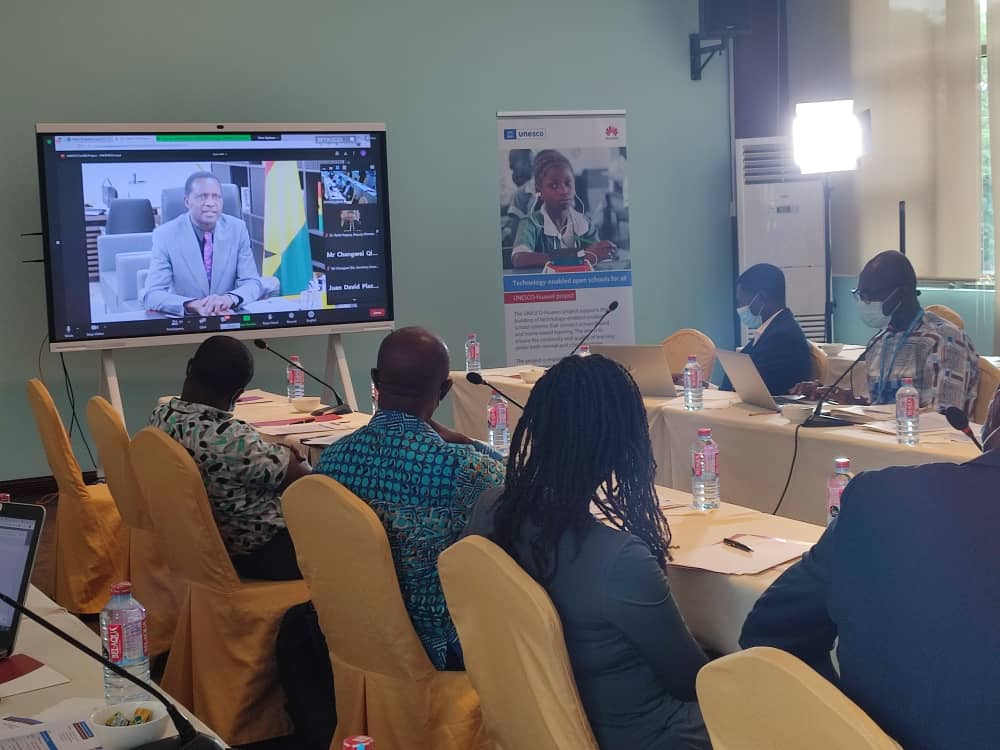
UNESCO/Huawei launch TeOSS project
A project which aims to build technology-enabled systems that will connect school-based and home-based learning has been launched in Accra to ensure the continuity and quality of learning even under crises situations such as pandemics.
Dubbed Technology-enabled Open School Systems (TeOSS), the project which is being funded at a cost of $720,000 is being implemented by the United Nations Educational, Scientific and Cultural Organization (UNESCO) and global ICT company, Huawei in Ghana, Ethiopia and Egypt.
Advertisement
The Project which was started in September 2020 in response to the disruption caused by the COVID-19 pandemic to global education, seeks to design and contextualize technology-enabled open school systems and support the building of local technology-enabled open school systems.
By July 2023, the implementors hope to have piloted, tested and scaled up the local technology-enabled open school systems.
In Ghana, the project is expected to benefit primary students, Junior High School students, out-of-school children and vulnerable groups are expected to benefit from the project in Ghana.
It is also expected to benefit stakeholders in Ghana's education sector including the Ministry of Education, the Ghana Education Service and staff who are in charge of school connectivity at the Centre for National Distance Learning and Open Schooling (CENDLOS).

Launch
Addressing a webinar to launch the project via a recorded video yesterday, the Minister of Education, Dr Yaw Osei Addutwum lauded the project which he said complements the government's determination to make Ghana's education system resilient.
He said as part of the government's effort to leverage ICT to enhance access to quality education, a One Teacher One Laptop initiative through which all public-school teachers were being provided with laptop computers had been initiated to enable them to facilitate teaching and learning more effectively.
“I am glad to note that this new project is building on the already established partnerships and collaborative efforts with our national institutions particularly CENDLOS, to facilitate the integration of ICT into the education system across board,” he said.
"I am informed that the development of this project has gone through a thorough consultative process during which many Ghanaian institutions including the Ministry of Education, Ghana Education Service, GIFEC and CENDLOS have made input to ensure that the deliverables are in alignment with the Government’s policies and priority areas especially Ghana’s Education Sector Plan (2018-2030)".
The Minister further assured of the government’s commitment to collaborate with UNESCO and other development partners to achieve the Sustainable Development Goal 4 of ensuring inclusive and equitable quality education and promoting life-long learning.
Expressing gratitude to Huawei and the beneficiary countries for the political commitment to the project, the Assistant Director-General for Education at UNESCO, Stefania Giannini said there must be a global effort to make education accessible to learners in times of crisis or not.
The Chief Marketing Officer of Huawei, Mr Kevin Zhang in his opening remarks urged all countries to use technology to overcome challenges to the quality of education globally.
He said the project will create platforms that ensure that "learning will never stop, no matter the situation".
Pilot
In an interview on the sidelines of the webinar, the Director of CENDLOS, Mr Nana Gyamfi Adwabour said since its inception, the project has been piloted at 10 schools across 10 regions in the country.
He said under the pilot, educators and learners had access to online and offline resources to ensure that schools based in communities without internet access and electricity could benefit from the project.
"The use of technology and internet in school and at home is increased to ensure continuity of learning always including crisis periods," he said.
"Basic school teachers develop e-contents and assessment modules using improved pedagogical models and this ensures that students will increasingly apply digital skills to improve their learning".
Expectations
Mr Adwabour said in Ghana, the project aligns with Ghana's Education Sector Plan (2018-2031), specifically, Policy objective 3 (Improved quality of teaching and learning in STEM at all levels) and ICT in Education reforms.
He said at the end of the project, CENDLOS hopes to have established learning platforms and access points to facilitate access to learning content in both online and offline form for learners and teachers in the pilot schools.
Mr Adwabour added that the government had put in place measures to sustain the results of the project and scale up the TeOSS model to more schools.



